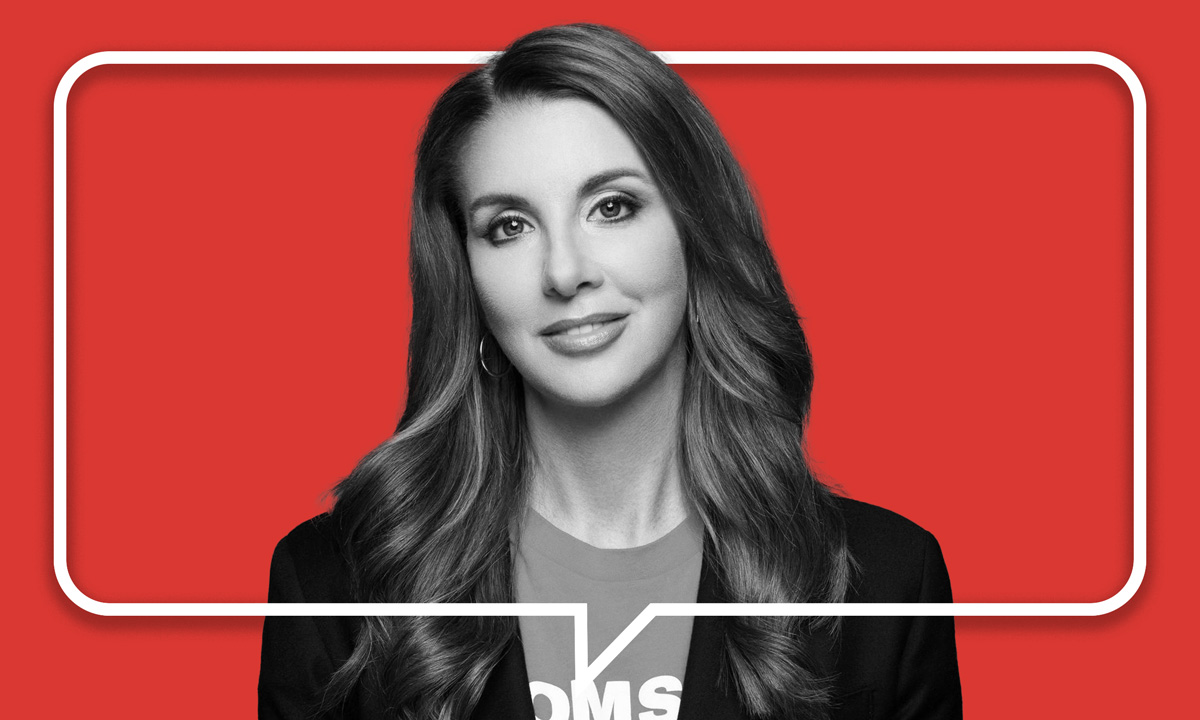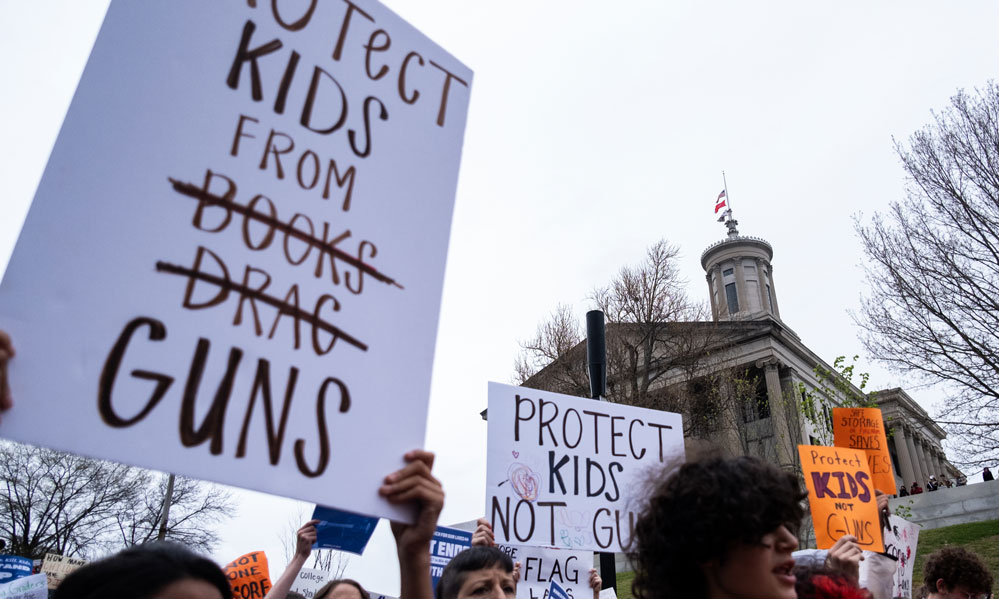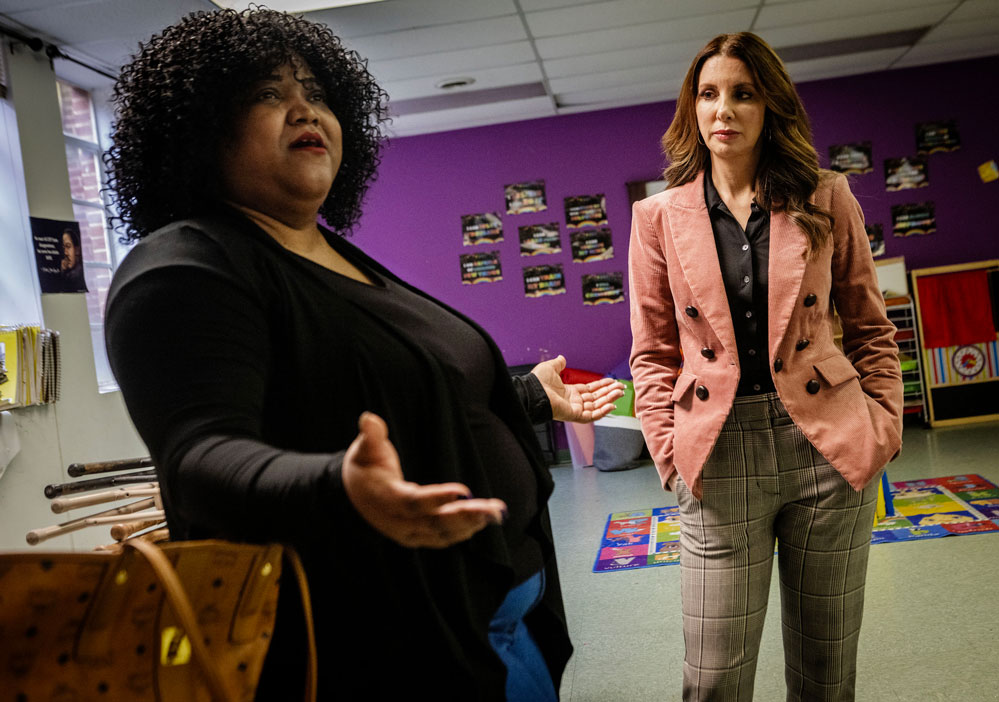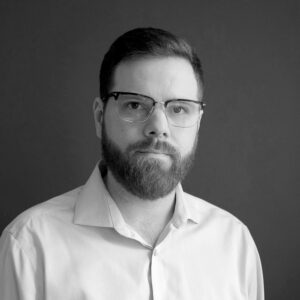The 74 Interview: Shannon Watts on the Power Moms Wield to Stop School Shootings
Moms Demand Action founder on the ‘seeds of gun extremism’ and the GOP’s use of ‘straw men’ to divert attention from guns after the Nashville shooting

Get stories like these delivered straight to your inbox. Sign up for The 74 Newsletter
It was the 2012 school shooting in Newtown, Connecticut, that brought Shannon Watts to action. From her Indiana home, the former communications executive and stay-at-home mother of five created a Facebook group for women who supported heightened gun laws.
What began as a modest community on the social media platform quickly grew into the political juggernaut Moms Demand Action, the nation’s largest grassroots gun control group and a primary foe of the National Rifle Association and their allies in Washington, D.C.
After fighting in the political trenches for more than a decade, Watts plans to retire this year after a long-fought win: Last year, President Joe Biden signed into law the first new federal gun rules in nearly three decades.
But the mass shootings haven’t stopped. On Wednesday, students nationwide marched out of their schools to demand additional gun control measures after a shooter killed six people — including three 9-year-olds — March 27 at a private Christian elementary school in Nashville. This week, Tennessee House Republicans moved to expel three Democratic state representatives who led a protest on the House Floor in response to the shooting and in solidarity with the hundreds of demonstrators, many of them young people, who packed the Tennessee Capitol.
The Nashville shooting has become the latest partisan flashpoint at the center of the country’s divisive political discourse. As students in Nashville and nationwide flood the streets to demand additional gun control measures, Republicans have latched onto the tragedy, which was carried out by a 28-year-old transgender shooter, with anti-trans rhetoric.

In an interview with The 74, Watts — who now lives in California and whose children are grown — said the GOP’s response to the Nashville shooting follows a long history of leaning on “straw men” to avoid an honest dialogue about gun violence. She also offered insight into the power of mom-led advocacy and advice for parents advocating for changes in their own communities.
The interview has been lightly edited for length and clarity.
This week it’s students who are walking out of school and hitting the streets protesting after the recent school shooting in Nashville. But we’ve been here before. What, if anything, is different this time? What factors have made this shooting in Nashville so politically galvanizing?
I think it’s different every time. There’s this idea that somehow there’s going to be a tragedy and everything is going to change overnight. And it didn’t happen after Columbine, it didn’t happen after the Sandy Hook school shooting, it didn’t happen last summer [after mass shootings in Buffalo, New York, and Uvalde, Texas]. But that doesn’t mean that things aren’t changing.
The system is not set up in this country for overnight change. The system is set up for people to get involved in democracy and that means that you do what I call the unglamorous heavy lifting of grassroots activism, and that forces incremental change.

I have seen over the last decade incremental change lead to a revolution. There’s been a seismic shift in American politics. Back in 2012, a quarter of all Democrats in Congress had an A rating from the NRA. Today, not one does. They’re proud of their Fs.
And we had 15 Republicans support the Bipartisan Safer Communities Act that passed last summer. So things are changing and I believe that after every national shooting tragedy, when people start to pay attention, you’re seeing change.
The NRA is incredibly weak. They really didn’t have a seat at the table when the Bipartisan Safer Communities Act passed. The fact that we have a 90% track record of stopping the NRA’s agenda every year, those things are only enabled by all of the change that has happened and added up over the last decade.
When you ask what’s different this time, I think it’s that there are even more people who are filled with rage over this situation, who know we don’t have to live like this. We sure as hell shouldn’t die like this. The more people who use their voices and vote on this issue, the faster we get to a place where our country isn’t run by the gun industry.
President Biden signed the first federal gun control measures in nearly three decades — yet these shootings keep happening. What do you see were the effects of the law that has been signed, and what more needs to be done to solve the problem?
The Bipartisan Safer Communities Act was a very important, critical step forward, but it was just one first step on a much longer journey.
We need to have background checks on all gun sales at a federal level, we need a Red Flag law, we need to make sure that domestic abusers can’t get guns, including stalkers. There’s so much that needs to be done, and we’ve done it really at a state-by-state level.
Blue states in this country now have pretty strong gun laws, whereas red states don’t. We’re only as safe as the closest state with the weakest gun laws, so we need much more to happen at a federal level. But in order to do that we have to have a Congress that will make that happen.
The idea that shootings were going to stop after the Bipartisan Safer Communities Act passed is not realistic, but I want to be clear that it is meaningful. It takes a multifaceted approach to looking at gun violence as a complex issue. It isn’t just mass shootings or school shootings, that’s about 1% of the gun violence in this country. It’s also domestic violence and gun suicide and community gun violence.
You asked what’s happened since the law was passed. The fact that we have stepped up background checks through the FBI through the Bipartisan Safer Communities Act, 119 buyers under the age of 21 have been blocked from gun sales because they were deemed too dangerous to have access to guns. Prosecutions have increased for unlicensed gun sellers. There are new gun trafficking penalties that now have been used in at least 30 cases across the country. Millions of new dollars have flowed into mental health services for children in schools and into community violence intervention programs.
President Biden said after the Nashville school shooting that he couldn’t do more on the issue without Congress at this point. What is your response to this admission?
I think that was a little more nuanced. I think he was basically saying that if we want holistic solutions for gun safety it really does have to be passed by Congress. I also want to be clear that the Biden-Harris administration has done more on this issue than any other administration in our nation’s history.
Right now, the House is controlled by gun lobby lackeys. They’re not only opposed to passing good gun safety laws, they’re actually attacking federal law enforcement and they’re pushing gun extremists’ laws that would put us at risk. Just hours after the shooting in Nashville, a House committee scheduled a vote on legislation that would make it easier to buy really dangerous assault weapons that have arm braces. It’s the same device that the shooter in Tennessee had.
So you know, I want to be clear that we’re making progress. If you’d asked me a year ago that we would have passed the first gun safety bill in 30 years that expanded background checks and funded state Red Flag laws and helps close what we call the boyfriend loophole, I would not have believed you.
So it is possible, and I think it’s inevitable, that our lawmakers at a federal level will eventually take action on this issue because their constituents are demanding it. There was a reason that Mitch McConnell whipped the votes on the Bipartisan Safer Communities Act and that’s because he saw polling that showed the Republican Party would be decimated if they did not act after Buffalo and Uvalde. That trend, especially when you see shootings like what just happened in Nashville, will only continue.
We’re seeing more and more gunfire on school grounds in this country and we know why. It’s because there’s unfettered, easy access to guns.
The Nashville tragedy was carried out by a person who was reportedly transgender. As such, many Republican lawmakers and pundits have blamed the shooting on the suspect’s gender identity — rather than on guns. In what ways are you working to counter efforts to divert the focus from firearms to other social issues?
We see these same straw men after every single shooting tragedy in this country. Republicans always want to make it about anything but what data shows is causing our uniquely American crisis, which is easy access to guns. You know, other nations have mental illness, they have access to video games, they have divorced parents.
The reason we have a 26-times higher gun homicide rate is that we give people easy access to guns. You know, the vast majority of mass shootings in this country have been by straight white men. And at no point have they said that that is a crisis, that we should really look at straight white men. It’s clear that that is just a way for them to divert attention because what they don’t want to talk about is the fact that too many guns and too few gun laws have given us the highest rate of gun homicides and suicides among all high-income countries.
Gun politics have long been divisive and you’ve found yourself the subject of sharp political critiques and, most alarmingly, death threats. There’s evidence of the country growing increasingly divided, and with that an uptick in political violence. In what ways have you experienced this change firsthand?
When I started Moms Demand Action, I was sort of living in a bubble. I was a white suburban mom and I got off the sidelines because I was afraid my kids weren’t safe in their schools. Then when you come to this issue, what you realize is that it is much more complex and much more holistic than that.
I was really shocked that we were having rallies and marches in those early days in Indiana and we were surrounded by men who were carrying loaded long guns in public. I was just shocked that that was legal. And in fact, open carry is legal in over 40 states in this country. To me it was a signal that something is very wrong.
The more and more we pushed on gun extremists, the more they pushed back by behaving that way and we saw them starting to open carry in stores which is why we started corporate campaigns to change their gun policies. What we were starting to see were the seeds of gun extremism. They felt like a right not utilized and expressed in public was a right they didn’t have, and the NRA actually pushed back on this idea. In 2014 they came out and called open carry ‘downright weird,’ and said it was not something that you do in normal society. And then just days later, they had to change their position because gun extremists in Texas were burning their NRA membership cards.
Every state has its own version of the NRA but it’s often to the right of the NRA and much more extreme. When I lived in Colorado, they’re called the Rocky Mountain Gun Owners. They believe any gun law whatsoever is an infringement on the Second Amendment. So the NRA tends to be pulled to the right by these extremists. I mean, in 1999, the NRA opposed guns in schools and supported closing the background check loophole. And certainly that’s a far cry from where they are today.
They’ve lost control of their Frankenstein, and gun extremism is now this recruiting tool. It’s an organizing principle, it’s a fundraising tactic all for the right wing. I mean, guns excite the right-wing base about things that have nothing to do with guns. And so it is getting young white men through the door, it is radicalizing them, these groups often play in conspiracy theories. Again, some of those were originated and propagated by the NRA.
The goal is to stoke fear, recruit new members and sell guns. Those fringe gun extremists that our volunteers were facing in those early days started showing up at state houses and anytime a statue was being removed and even threatening lawmakers and police officers and fellow citizens.
We’ve tracked armed demonstrations since 2020 and found that they’re six times more likely to be violent or destructive than demonstrations where people are not armed. It seems pretty intuitive, but the data bears this out.
So to answer your question: Yes, I think gun extremism is on the rise and is a very dangerous threat to democracy.
Tennessee Rep. Andy Ogles deleted a recent family Christmas card from social media after you criticized the photo, which featured the lawmaker and his family wielding guns. Republican lawmakers have faced similar criticism in recent years for posting similar family portraits. Why do you think it’s important to highlight these images? Are you concerned that the attention may ultimately play into their hands?
I think it’s fascinating when these gun extremists back down, like deleting the photo. I think it’s really important to point out that this is the culture that’s killing us.
This idea of unfettered access to guns and treating them like toys, like putting them in the hands of children. Both of my grandfathers were World War II veterans. They were responsible gun owners, they had the highest amount of respect for those guns and in a million years would not have posed with them like they were toys as opposed to tools meant to kill things.
It’s really important that we shine a light. Sunlight is the best disinfectant and that’s certainly the case when it comes to gun extremism because people see this behavior. The vast majority of Americans — regardless of whether they’re gun owners or not, regardless of whether they’re Republicans or Democrats — they support common sense gun laws. And I think that seeing that kind of gun extremism is a turnoff to most Americans and they know that’s not who they want making our policies.
You began your advocacy after the Sandy Hook shooting in 2012 with a Facebook group. What is it about grassroots, mom-led advocacy — based on the idea behind Mothers Against Drunk Driving — that makes it a particularly effective gun control advocacy approach?
Bigger picture, women are the secret sauce to advocacy in this country and frankly, in the world. If you go back to when women were first allowed to be activists in America, which was Prohibition … they [men in power] could never really put that genie back in the bottle. Once women got off the sidelines, they wanted to use their voices on issues that they cared about.
We are often given the task of caring for our families and our communities. All the way from Prohibition up to the water crisis in Flint, Michigan, it’s really been women and mothers forcing change in this country and using the power available to them. We are the majority of the voting population, we’re the majority of the population — period. So when we use our voices and our votes, we can affect change.
I often go back to something that feminist author Soraya Chemaly said. She wrote the book Rage Becomes Her and she featured Moms Demand Action in there and she and I had a conversation about this and she said, ‘You know, 80% of the lawmakers in this country are men and men are inherently afraid of their mothers.’
The lawmakers in this country are either very, very excited to see us show up — hundreds or even thousands of us at a time in our red shirts — or they’re very, very afraid. So that can be a powerful coalition.
Given your success in taking that Facebook group and turning your advocacy into the size of the organization that you did, I’m curious what lessons you learned about American politics and policymaking? What advice do you have for other mothers and other women who are working to inspire change in their own communities?
I don’t think that men are as afraid to fail in public because that’s sort of seen as brave and courageous, where I think women feel like there’s blowback when they’re not perfect, or if they fail.
If I had waited until I knew everything there was to know about gun violence or organizing, I still wouldn’t have started Moms Demand Action. I think it’s important to birth your ideas into the world. The very worst thing that can happen is that you fail and that you learn from that failure and you try something again.
[In 2014, Moms Demand Action merged with Mayors Against Illegal Guns, an advocacy effort by former New York City Mayor Michael Bloomberg, to form the nonprofit Everytown for Gun Safety.]
I had this great reverence for lawmakers before I started Moms Demand Action and I assumed they were very smart and committed and concerned and kind and unfortunately what you learn is that too many of them are not and they really don’t want to listen to what you have to say. But if you are an activist who is all of those things — concerned, committed, compassionate, curious — you would make a great lawmaker. I’m very proud of the fact that hundreds of our volunteers have decided to take a leap from not just shaping policy but to actually making it and running for office and winning.
In this last electoral cycle, in November, 140 of our volunteers ran for office and won at all levels of government. We have volunteers who are now members of Congress. I think that’s a really important lesson, too, which is that women make great lawmakers.
After more than a decade in this work, at the end of this year you plan to retire. What motivated that decision and what’s next for you?
I’ve been a full-time volunteer, it’ll be 11 years at the end of this year, and that’s a long time to do this work. But also, I’ve asked myself that question because I think it’s important for a founder’s role to be finite. I never imagined I would spend the rest of my life doing this work. I’m so honored and so proud to have sort of lit the spark, but it really is up to other new and emerging leaders to keep that going.

This movement needs to last into perpetuity and so, by stepping back, I think I enable other leaders to step forward. I’ll still be a volunteer for Moms Demand Action, I’ll just be doing it as a California Moms Demand Action volunteer. We have leaders who are ready to step up inside the organization and outside the organization, and I think that’s really exciting.
As for me, for what’s next, I obviously will always care about this issue and it will be very important to me and I will use my voice in different ways. Something I’m really passionate about is empowering women in all different ways, but particularly running for office.
I don’t have an answer for you on specifically what’s next. I will be with Moms Demand Action through the end of the year, I will certainly rest a little bit and I’m going to be teaching at USC starting in January and, other than that, I’ll figure out what’s next when the time comes.
Get stories like these delivered straight to your inbox. Sign up for The 74 Newsletter



